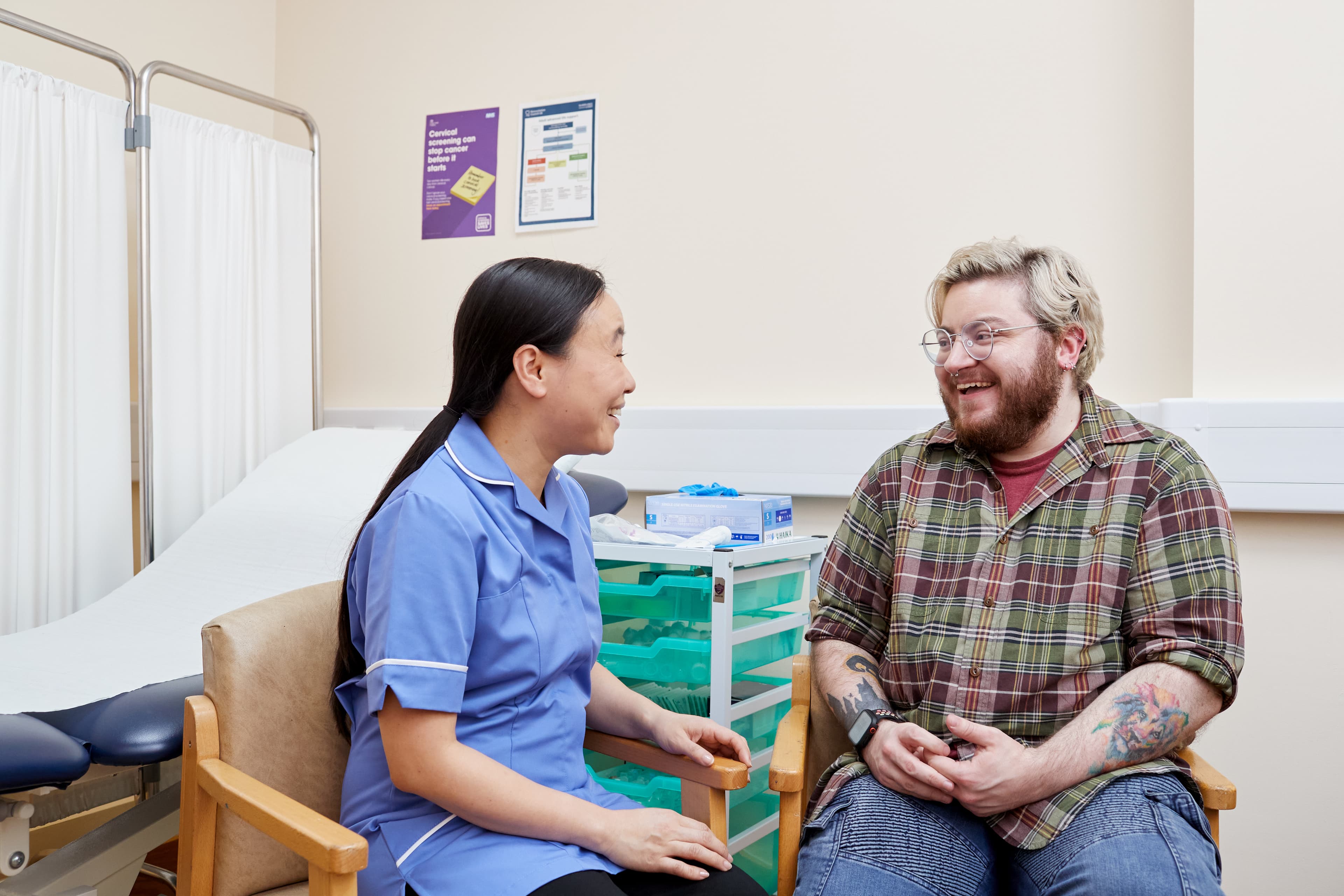Screening for cancer
People of all genders are entitled to the same medical care when it comes to cancer prevention, diagnosis and treatment. But research has shown there are additional considerations and barriers felt by gender diverse people.
This information covers UK cancer screening programmes and eligibility for transgender (trans) and non-binary people.
It also discusses cancer risk, and how you can reduce your risk of cancer.
Cancer screening is a test that looks for early signs of cancer in people with no symptoms. It can help spot cancers at an early stage, when treatment is more likely to be successful.
There are 3 national screening programmes in the UK: cervical screening, breast screening and bowel cancer screening. There is also a new NHS Lung Cancer Screening Programme that is slowly being introduced for people at high risk of lung cancer.
On this page we explain the 3 national cancer screening programmes and who is eligible for them, with a focus on trans and non-binary people.
Your sex assigned at birth, as well as any hormones or surgeries you may have had, is relevant to whether you are eligible for some types of cancer screening.
It’s your choice whether or not you take part in screening. If you are interested in participating in screening you can contact your GP, Gender Identity Clinic, local sexual health clinic or local breast screening service to ask for more information about a screening programme. It's important to understand the possible benefits (pros) and risks (cons) of the screening test. This information can help you make the decision that is right for you.
Remember, cancer screening is for people who do not have symptoms. If you have symptoms or have noticed anything that is not normal for you, tell your doctor - don't wait for a cancer screening invitation. We have advice on talking to the doctor here.

Image by Patrick Harrison
Some gender diverse people may have concerns about taking part in screening. You might have concerns if the waiting room is a very gendered environment or be worried that the appointment type may inadvertently disclose your sex assigned at birth.
But there are steps you can take to make you feel more comfortable.
You can call the GP or clinic in advance to discuss the waiting room environment and ask to be booked at a time when patients of all genders will be attending appointments. You can also request to be booked for the first or last appointment when it is likely to be quieter.
You may wish to bring a friend or partner with you, and they can come into the consulting room when you are called. You can also ask to be called in by your surname and first initial.
Consider calling the clinic in advance to privately discuss over the phone any preparation that is required before the appointment.
Some clinics specialise in health services for trans and non-binary people. Ask your doctor or Gender Identity Clinic about the nearest specialist clinic.
OUTpatients provide a list of sexual health clinics in England that offer specialist services for trans and non-binary people.
Cervical screening is a way of preventing cervical cancer. It tests for the human papillomavirus (HPV), which causes almost all cases of cervical cancer. Cervical screening can spot any abnormal cell changes in the cervix so that they can be treated before they have chance to develop into cancer.You may have heard cervical screening called a ‘smear test’. Find more detail on what cervical screening is.
This can include the following people if they have not had an operation to remove their womb and cervix (a full hysterectomy):
trans men
non-binary people assigned female at birth
cisgender women
HPV is a very common virus. It’s passed on through person-to-person contact, usually through sexual activity. For most people, the infection will be cleared from the body and they will never know they had it. But there are ‘high-risk’ types of HPV that increase the risk of some types of cancer. This includes cervical cancer, some types of head and neck cancer and cancers of the vagina, vulva, penis and anus.
Find out more about HPV and cancer.
The HPV vaccine helps to prevent cancer by protecting against HPV. The HPV vaccine is offered to all children aged 11-13 in the UK. But it is also available for free from a sexual health clinic to some men who have sex with men and some transgender people. Find out more about the HPV vaccine.
Screening can help to find breast cancers at an early stage, when treatment is more likely to be successful. Breast screening uses a test called mammography which involves taking x-rays of the breasts.Find more detail on what breast screening is
This can include:
trans men and non-binary people assigned female at birth who have not had an operation to remove the breasts (bilateral mastectomy or 'top surgery')
trans women and non-binary people assigned male at birth and who have taken feminising hormones
cisgender women
Bowel cancer screening aims to find bowel cancer early or find changes in the bowel that could lead to cancer.The bowel cancer screening programme sends a bowel cancer testing kit to people who are eligible to take part. You need to be registered with a GP to receive your screening kit, which will be sent every 2 years. You do the test at home and send your sample to the hospital for analysis.Find more detail on what bowel cancer screening is.
If you are a trans woman who has had genital reconstruction surgery (vaginoplasty) using a loop of bowel, make your GP aware of this when you are eligible for bowel screening.
Research into cancer in people who are trans or non-binary is limited. At the moment there is no reliable evidence of an overall increase in the risk of cancer for gender diverse people compared to cisgender people.A person’s risk of cancer depends on many different things. Some things that increase the risk of cancer can’t be changed, such as getting older or a family history of cancer.But it is important to remember the proven causes of cancer and the things you can do to reduce your risk. You can lower your risk of cancer by:
not smoking
keeping a healthy weight
staying safe in the sun
drinking less alcohol
eating a healthy, balanced diet
Most cancers are not hereditary. But some families have several members diagnosed with breast, ovarian or prostate cancers. There’s a small chance this could be due to an inherited faulty gene. If you have concerns about your family history of cancer you can discuss this with your Gender Identity Clinic or GP. They can refer you to a genetics clinic if they think you may be at an increased risk.
Find out more about inherited cancer risk.
Currently, there isn’t enough quality research to determine the impact of gender-affirming hormone therapy on an individual’s risk of cancer overall. Some areas of research on hormone therapy and cancer risk are outlined below. You can discuss cancer risk and gender-affirming hormones and surgeries with your Gender Identity Clinic or GP. When considering any risks, the benefits of gender-affirming care must also be considered.
A recent study found that breast cancer was more common in trans women than in cisgender men.
It is possible the increased risk of breast cancer may be due to the feminising hormones that help breasts develop. Examples include oestrogens, and antiandrogens, like cyproterone acetate.
But the study showed that breast cancer is still less common in trans women than in cisgender women, and the number of cases of breast cancer in trans women was very small. We need further research in this area to be able to draw conclusions on breast cancer risk in trans people.
The hormone cyproterone acetate is sometimes offered to trans women and people who are non-binary to lower testosterone. It has a small increased risk of benign brain tumours called meningiomas.
Some trans men and non-binary people assigned female at birth take the hormone testosterone. Some studies have suggested that testosterone may increase the risk of thickening of the womb lining (the endometrium), which can lead to womb cancer. But the research is not conclusive, and the long-term effects of testosterone on the womb have not been adequately researched. In most cases, testosterone causes thinning of the womb lining.
If you have not had a hysterectomy and you have been taking testosterone for two or more years, your GP or Gender Identity Clinic may recommend a pelvic ultrasound every two years, to monitor the lining of the womb. This ultrasound is performed in a hospital outpatient setting.
Tell your doctor about any unexplained bleeding from your genitals.
This information has been produced in collaboration with;
Dr Alison May Berner
Academic Clinical Lecturer in Medical Oncology (Barts Cancer Institute); Specialty Doctor in Adult Gender Identity Medicine
based at The London Gender Identity Clinic
And with input from OUTpatients (LGBTQI+ cancer charity)

About Cancer generously supported by Dangoor Education since 2010. Learn more about Dangoor Education
What to ask your doctor about clinical trials.
Meet and chat to other cancer people affected by cancer.
Questions about cancer? Call freephone 0808 800 40 40 from 9 to 5 - Monday to Friday. Alternatively, you can email us.